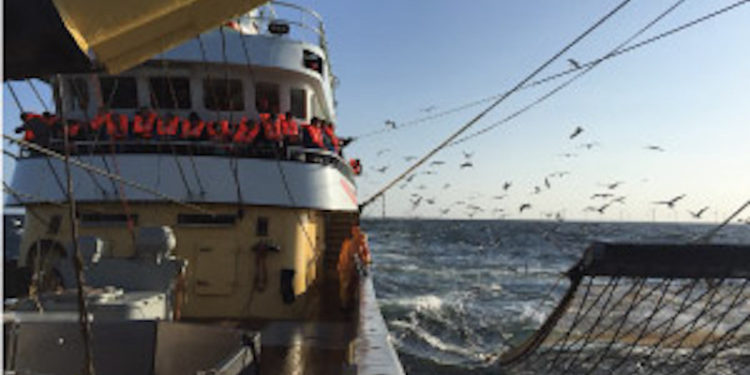This week the Dutch Ministry of Agriculture, along with Dutch Fishermen’s federations de Nederlandse Vissersbond and VisNed organised a trip for interested parties from all over Europe, including representatives of Bloom, joining the TX-36 in IJmuiden. The aim of the trip was to demonstrate that openness and transparency are paramount.
‘Many negative allegations are made about pulse gear. Scientific research by respected independent institutes is criticised by action groups. With the invitation for a fishing trip on a pulse trawler we hope to have provided many answers to the questions that are there,’ said Durk van Tuinen of de Nederlandse Vissersbond.
During the fishing trip, which started at 17:00, fishing was conducted with the pulse gear, while those participating were also able to see how the gear is handled, and how the flatfish were caught and processed.
According to Pim Visser of VisNed, pulse fishing has been under attack for months by some environmental organisations in collaboration with groups of small-scale fishermen, claiming that pulse fishing causes extensive damage to marine life and the catches of coastal fishermen.
‘Fishermen are set up and played against each other,’ said Durk van Tuinen. ‘We understand that there can be different points of view within the same profession. That is why we as fishing organisations strive for consultation and making mutual agreements.’
‘Inciting fishermen against each other is an objectionable strategy,’ Pim Visser added, commenting that in the past year areas have been protected from pulse gear by mutual agreements and an open dialogue is being held with each member state.
He said that studies by independent institutes into pulse gear show promising results in the field of reduction of unwanted by-catch, halving fuel consumption and less disturbance of the seabed. In addition, the recently published advice by ICES ICES states that they do not find the claims long-term consequences of pulse gear on the seabed or sea life plausible.
‘The viewpoint of action groups does not seem to be about the pulse gear itself, but about the emotion that is involved. Scientific investigations are ignored or sidelined by the activists,’ Pim Visser said.
The trip was held one day before the International Pulse Dialogue Meeting in Amsterdam. This meeting has brought together scientists, fishermen’s organisations, government bodies and NGOs from all over Europe.
‘Action groups portray pulse fishermen in the media as fraudsters and manipulators, but together with science we want to provide clarity and answer questions. This has been happening for several years in the International Pulse Dialogue Meeting, where all the action groups involved are also very welcome,’ Pim Visser said.
The future of pulse gear will be discussed in the coming weeks in the trilogues between the European Parliament, the European Commission and the European Council of Ministers.









